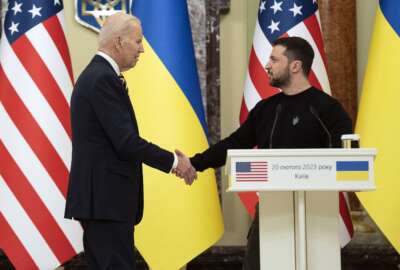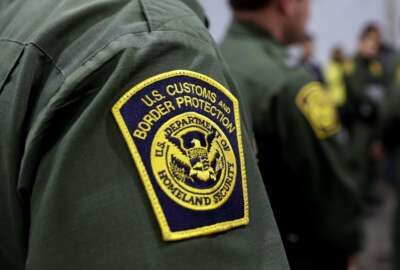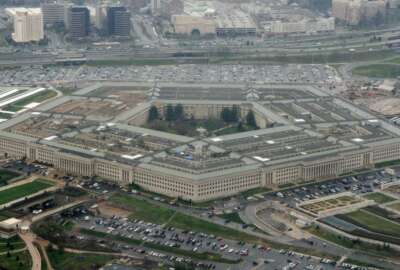Hubbard Radio Washington DC, LLC. All rights reserved. This website is not intended for users located within the European Economic Area.
How the administration could deal with the Texas National Guard
Can the federal government resolve a long-running dispute with the Texas National Guard. And if it could, should it? The Guard, under Gov. Greg Abbott, has been...
Can the federal government resolve a long-running dispute with the Texas National Guard. And if it could, should it? The Guard, under Gov. Greg Abbott, has been running its own border-protection operation, at times keeping Customs and Border Protection out of the way. For one view of the legalities here and what the federal government could do, the Federal Drive with Tom Temin spoke with the Brennan Center for Justice counsel for liberty and national security, Joseph Nunn.
Interview Transcript:
Tom Temin And you’re writing that the federal government or the Biden administration could take on this effort, but probably it’s not a great idea. What’s your thesis here? And should they do it in the first place after all? Governor Abbott is keeping some of the migrant surge out with what he’s been doing.
Joseph Nunn Yeah. The issue here is really the president can take control of the Texas National Guard if he wants to. The question is not really one of lawfulness. It’s a question of whether it would be appropriate. And the answer to that question is no. At this point, federalizing the Texas National Guard would be premature. If you look at the intent behind the relevant law, the way it’s been used in the past, and generally how we resolve these sorts of disputes between the states and the federal government in the United States.
Tom Temin And what is the relevant law and how would it work?
Joseph Nunn The law we’re concerned with here is the Insurrection Act. Now, I will back up for a moment. There are a variety of statutes that allow the president to federalize the National Guard. Most of those are really concerned with what you might call the operational needs of the armed forces. Say we find ourselves in a large war and the Pentagon needs more troops, or they need more of a particular kind of unit the National Guard has. The president can federalize portions or all of the National Guard for those purposes. None of those statutes apply here. What we’re looking at is really two statutes. One is the Insurrection Act. The other is a statute called ten U.S.C. section 12 406. Section 12 406 is a very strange statute. On the one hand, it seems to give the president a unilateral authority to federalize National Guard. On the other hand, it requires orders for this purpose is to be issued through the state governors. That is an odd construction on the part of Congress. If we’re talking about a unilateral presidential authority. What if the governor says no? I mean, you can imagine litigation flowing from that. But it’s a strange statute. By contrast, the Insurrection Act. It’s not ambiguous. And also, if you look at past practice, on those rare occasions when the president has needed to take away control of the National Guard from a misbehaving state governor, we might say that’s always been done through the Insurrection Act. So, while the law is a little bit muddy when it comes to 12 406, the safest assumption is that if President Biden wanted to federalize Texas National Guard and, you know, order them to stand down, he would have to do so through the Insurrection Act.
Tom Temin And nowadays, insurrection has become a loaded word. You know, people have different interpretations of what was called an insurrection. Some people have been charged with insurrection, some have not. But how is it insurrection if the Texas National Guard is simply doing what some might say CBP ought to be doing? They seem to be aiding the federal government here.
Joseph Nunn So this is an instance where the Insurrection Act probably could have a better name. The Insurrection Act exists certainly to allow the president to deal with insurrections when you when you have a rebellion against state or federal authority. I think in the very early American history, the Whiskey Rebellion, but also the Civil War, the Insurrection Act exists for those circumstances. The Insurrection Act also serves to allow the president to deploy the military, to enforce the law, when civilian authorities are otherwise overwhelmed, when some sort of crisis is preventing civilian authorities from executing the law. It also allows the president to deploy the military to execute the law when a state is interfering with the execution of federal law in some way. So, the classic example here is little Rock, Arkansas. In 1957, when the governor of Arkansas was using the Arkansas National Guard to physically prevent the Little Rock Nine, nine black schoolchildren from entering little Rock Central High School and integrating the school. And President Eisenhower famously invoked the Insurrection Act, federalized the Arkansas National Guard, ordered them to stand down, and also deployed the 101st Airborne Division to escort the children to school. So that scenario is what some people are imagining when they’re calling on Biden to federalize Texas National Guard. Stand down. The argument is that Texas is interfering with federal immigration enforcement and border security.
Tom Temin We’re speaking with Joseph Nunn. He’s counsel for liberty and national security at the Brennan Center for justice. But you are arguing. Against doing that now, against doing it at this time. What’s your reasoning?
Joseph Nunn I am arguing against it. And little Rock is really a useful example for explaining that argument. The crucial difference between Little Rock and now is really twofold. The first thing is the governor of Arkansas in 1957, was using the National Guard to directly defy a federal court order. There was a federal court order to integrate little Rock Central High School immediately. Not in a month, immediately. And the National Guard was deployed to physically stop that from happening. President Eisenhower waited until the federal judge had exhausted all of the options at his disposal that he would ordinarily use to see that his orders were enforced. He turned to the Insurrection Act as a last resort in that sense. And also, and this is the second thing in little Rock. Eisenhower did not invoke the Insurrection Act until there was a clear and imminent threat of mob violence, that the specifically were anti-Black mob violence targeting these nine schoolchildren. Eisenhower waited until he really had no other choice. He treated the Insurrection Act as a last resort, which is what he should do. That’s not the situation we have in Texas. This is not Little Rock. A number of people pushing the Biden administration to federalize Texas National Guard have pointed to the Supreme Court’s recent order, but the Supreme Court has not actually ordered Texas to do anything.
Tom Temin That’s the order saying that CBP had the authority to cut the concertina wire.
Joseph Nunn Precisely. All that the Supreme Court did was vacate the Fifth Circuit’s injunction that was barring CBP from cutting that wire. As things stand, there’s no court order for Texas to violate. CBP can cut through that wire. Texas, as it stands, is free to put the wire back up if CBP wants to cut the wire and Texas wants to restring the wire right after the CPB agents walk through it. They can do that until there’s a court order to the contrary.
Tom Temin Or until one side gets sick and tired of it, I guess, which is not a great way to run.
Joseph Nunn Or one side runs out of money.
Tom Temin So at what point would the administration then you feel be justified in invoking the Insurrection Act?
Joseph Nunn So I think there are a couple of scenarios. The first is going back to a court order. If we come to a situation where Governor Abbott is directing the Texas National Guard to defy a federal court order, then it becomes appropriate, I think, to invoke the Insurrection Act that would fall in line with past historical practice and with the intent of the law, or if Governor Abbott otherwise directs the Texas National Guard to do something that will not permit delay. For example, you know, to be clear, I don’t think this was likely. If Governor Abbott were to instruct the Texas National Guard to try and arrest federal officials or occupy federal property at that point, that, like defying a federal court order, becomes something that is fairly described as rebellion against the authority of United States and in the terms of the Insurrection Act.
Tom Temin That would be like.
Joseph Nunn And it would become a.
Tom Temin Shelling of Fort Sumter or something.
Joseph Nunn Yes.
Tom Temin None of that is likely to happen. So, it seems like there’s just going to be this standoff for a while.
Joseph Nunn I think that’s right. And I think that underlines one point that I think is really important here, which is there’s a lot of room left to litigate here in the United States when states and the federal government disagree. They solve those disputes in court whenever possible. Up until quite recently, the Biden administration has not aggressively asserted the federal government’s prerogatives in federal court. There has not been a lot of litigation coming from the Biden administration. If the Biden administration were to, you know, jump directly from doing very little to straight to the Insurrection Act. That would be inappropriate. There is an enormous amount of room still here to resolve this for the courts, which is what the states and the federal government do in a country that has the rule of law.
Copyright © 2024 Federal News Network. All rights reserved. This website is not intended for users located within the European Economic Area.
Tom Temin
Tom Temin is host of the Federal Drive and has been providing insight on federal technology and management issues for more than 30 years.
Follow @tteminWFED





